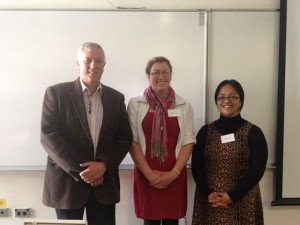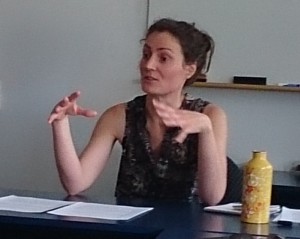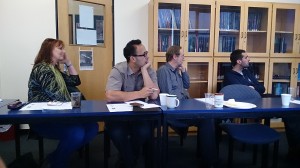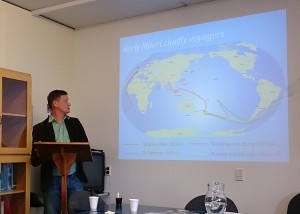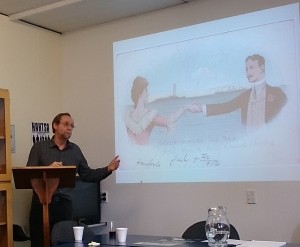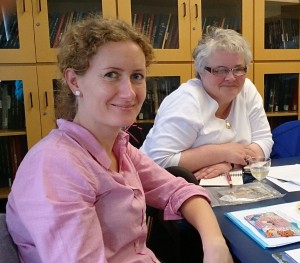“Objects book” progress
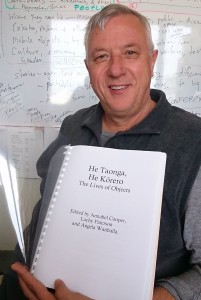
Manuscript ready for sending to Conal.
In February 2013 CROCC held its inaugural conference on “colonial objects”. This was a successful event attracting academics, librarians, archivists, heritage professionals, and others. It was always our intention to publish a collection of essays coming out of the conference presentations. The editors, Annabel Cooper, Lachy Paterson and Angela Wanhalla still have some loose ends to tie up (ably assisted by their RA, Katie Cooper) but are happy to report that our draft is almost ready. It has now been sent to Conal McCarthy at VUW to read and add a final reflective essay. Then it will be off to Otago University Press to perform their magic. Expect it in the bookshops in 2015. A big thank you to all involved.
CFP: Migrant Cross-Cultural Encounters
Migrant Cross-Cultural Encounters: A Multidisciplinary Conference
24-26 November 2014
University of Otago, Dunedin, New Zealand
Historical and contemporary global migration involves a range of cross-cultural encounters, but how are these interactions discussed, debated, and defined? This three-day multidisciplinary conference seeks to examine past and present migrant encounters with other peoples in a diverse range of locations. Papers from various disciplinary angles are welcome from a variety of themes and from any historical period or region.
Themes may include but are not limited to:
- Race, ethnicity and citizenship
- War, migration and cross-cultural contact
- Labour, migration and cross-cultural encounters
- Empire, contact and mobility
- Gender, migration, and cross-cultural encounters
Please provide:
- a title
- a 250-word abstract of your paper
- brief biographical information (including institutional affiliation and contact details).
All proposals will be assessed after the deadline of Friday 11 July 2014. If you require an earlier acceptance please advise us.
Proposals or requests for further information should be sent to: migrants@otago.ac.nz
The conference is sponsored by four key multidisciplinary research hubs in the Division of Humanities at the University of Otago:
- Centre for Irish and Scottish Studies
- Centre for Research on Colonial Culture
- Asian Migrations Research Theme
- Comparative and Cross-Cultural Studies Research Theme
For further information see the website (click the highlighted text).
Crowns and Colonies: Monarchies and Colonial Empires
An international conference convened by Robert Aldrich and Cindy McCreery
With a keynote address by Professor Miles Taylor, Director of the Institute for Historical Research, University of London, on Queen Victoria and India
Department of History,
School of Philosophical and Historical Inquiry
University of Sydney
11-13 June 2014
From the time of Alexander the Great and the Roman Caesars down to the empire of Queen Victoria and beyond, monarchism and imperialism have often been linked – indeed, republican colonial empires have been notable exceptions in international history. Napoleon III dreamed of constructing an ‘Arab kingdom’, Victoria was proclaimed Empress of India, King Leopold created his own realm the Congo, and Italy’s King Victor Emmanuel III was named Emperor of Ethiopia. Even today the Commonwealth of Nations is bound together by the figure of the British monarch, and the Danish queen reigns over Greenland and the Faeroe Islands.
Outside of Europe, as well, monarchs ruled over disparate peoples, their hereditary and often sacred positions bringing together under a crown the empires of China, Japan, the Ottoman state and several pre-colonial African empires. Non-Western monarchs – Zulu chieftains, Indian maharajahs, Emperor Haile Selassie, the king of Korea among others – were themselves often displaced by imperial conquest. Nationalist movements sometimes campaigned for the restoration of dynasties, at other times for abandonment of ‘feudal’ rule.
This international conference, and a proposed collection of essays commissioned from participants, explores the links between crowned rulers and their colonial possessions. Paper proposals are invited on any historical period or region.
Themes may include but are not limited to:
- different theories of kingship in relation to colonial empire;
- royal initiatives in colonial expansion and patronage of colonial expeditions, chartered companies and learned societies;
- the legal position and prerogatives of monarchs in colonial systems;
- interventions by monarchs in colonial politics and governance;
- royal visits to colonies (and visits by colonial rajas, sultans and other rulers to colonial metropoles);
- royal personages in the colonial military and administration; representations of monarchs in colonies (statues, buildings, artwork) and commemoration of royal births, anniversaries and deaths; royal honours, decorations and investitures;
- movements for the restoration of indigenous dynasties abolished by colonial authorities;
- the repercussions of metropolitan and nationalist republicanism and dissolution of monarchies in the colonial world;
- and links between former colonies and monarchies (as in the Commonwealth).
Please send proposals of papers by 15 February 2014
Please include the following:
- Your academic or professional affiliation and full contact details (email, telephone and postal address)
- The title of your proposed presentation
- A 250-word abstract
- A one-page cv or list of your major publications
All proposals will be assessed after the deadline of 15 February 2014.
Please note that there will be no registration fee for the conference. There will be a conference dinner at participants’ own expense.
Contact: robert.aldrich@sydney.edu.au; cindy.mccreery@sydney.edu.au
NZHA Conference Makes History
The recent New Zealand Historical Association Conference, which held at the University of Otago from 20-22 November 2013, was special for a number of reasons. For the first time a panel session was offered in te reo Maori. Organised by CRoCC member Lachy Paterson, the te reo panel was both pioneering and well-received. Congratulations to Lachy and his co-panellists, Megan Potiki (Te Tumu) and Migoto Eria (Hawke’s Bay Museum and Art Gallery) on this fine achievement.
The NZHA conference also saw the premiere of a documentary, Children of War, a major outcome from Professor Judy Bennett’s Marsden-funded project on the fate of the children fathered by American servicemen with Indigenous women during the Pacific War. This was a particularly special event because Arthur Beren, who features in the documentary, was in attendance and spoke at the premiere as did Steven Talley, the producer of the documentary. Click on the highlighted text to read an Otago Daily Times story on the film.
Congratulations to the NZHA on a fine event and for making history by including a te reo panel and a film screening at the biennial conference for the very first time!
Mary Boyd Prize
Congratulations to Tony Ballantyne of CRoCC in winning the inaugural Mary Boyd Prize for the best published history essay. The judges were Margaret Tennant (Massey) and Felicity Barnes (Auckland) and was awarded at the NZHA conference dinner at Otākou Marae on Thursday 21 November for his essay “On Space, Place and Mobililty in Nineteenth-Century New Zealand” in the New Zealand Journal of History April 2011.
New Historical Perspectives on New Zealand and the Sea
This past few days have been a veritable “history week” in Dunedin, providing a diverse and fruitful time for historians with a string of connected events. One, a specifically CROCC workshop – “New Historical Perspectives on New Zealand and the Sea” – discussed below, capped off the week, but CROCC members were present at all events, and were involved in the organisation of most of them.
Things kicked off on Tuesday with the one-day conference of the Religious History Association of Aotearoa New Zealand at the Presbyterian Archive Research Centre (Hewitson Library, Knox College). I heard from John Stenhouse and Hugh Morrison (CROCC members) that this ran really well. On Tuesday CROCC also ran a successful workshop for postgraduate students working on empire and colonialism at St Margaret’s College. Tony Ballantyne and Maya Jasanoff (Harvard University) led discussions with about 15 postgraduates from Otago and other New Zealand universities.
The main event was of course the New Zealand Historical Association’s biennial conference held in the St David Lecture Complex, at the University of Otago, with about 200 attendees enjoying three days of multi-streamed presentations and five brilliant keynote speakers: Maya Jasanoff, Damon Salesa (University of Auckland), Elizabeth Elbourne (McGill University) Atholl Anderson (Australian National University), and Henry Yu (University of British Columbia). It is worth noting that while not an official Centre event, the organising committee (Tony Ballantyne, Angela Wanhalla and Michael Stevens) and NZHA executive (Tom Brooking, John Stenhouse and Barbara Brookes) are all CROCC members. One of the highlights of the conference was the conference dinner (and Atholl Anderson’s keynote address) out at Otākou Marae, on the Otago Peninsula. No doubt, there will soon be much more information on the NZHA conference on the History Department’s Facebook page.
On Saturday the CROCC-sponsored event, New Historical Perspectives on New Zealand and the Sea, organised by Frances Steel (University of Wollongong), was held in the History Department at the University of Otago. It began with Jonathon West offering a short discussion remembering Ian Church who passed away recently. Ian was a well-published local historian with a keen interest in maritime history who was very generous with his time and knowledge with a number of younger historians. Frances then opened the conference proper posing some ideas and questions with relevance to oceanic and maritime histories.
The first speaker was Michael Stevens (University of Otago) who has recently won a prestigious Fast-Start Marsden research grant to look at the “global” aspects of Southland’s coastal port of Bluff. Michael of course discussed Bluff, but in particular explored how the colonial history of Māori might be reframed to incorporate the sea. Jonathan West (Waitangi Tribunal) followed with a talk that investigated what lies beneath the surface of the sea, and how it was the nature of the ocean current currents and the coastal and marine topography that provided such a bounty in the surrounding waters for first Māori, and then for the Pākehā settlers. Alison MacDiarmid (NIWA) then gave a fascinating talk on how humans have affected the marine ecosystems around New Zealand. While some species have disappeared from some areas, there is some good news, with some other species now regenerating. Her research is just part of wider multi-disciplinary research involving scientists as well as archeologists and historians.
After a short break, Susann Liebich (James Cook University) discussed her current research on magazine culture, and how maritime themes and stories appeared in their content of Australian magazines between the wars. Philip Steer (Massey University) followed with an analysis of how a number of recent New Zealand historical novels have incorporated the sea and sea travel within the plot lines. After lunch David Haines (Waitangi Tribunal) took us back to the pre-Treaty days when Māori were active in sea travel, not just to New South Wales, but also as far as London. He sketched out the stories of two voyages by Māori rangatira between Sydney and New Zealand, one to the Bay of Islands, the other from southern New Zealand, illuminating the ways that Māori chiefly status might manifest itself on board these sailing ships. Peter Gilderdale (AUT University) then brought us to the late Victorian and Edwardian colonial period when “Hands Across the Seas” postcards linked New Zealand (and other colonies) to Britain, and sometimes to the USA. These postcards proved particularly popular with migrants, often featuring oceanic steamship travel. Tony Ballantyne gave the last prepared presentation on transport, communication and the flow of ideas, and how the speed and pace of colonial life changed as technologies developed. The afternoon was then brought to an end by two thoughtful responses from Jonathan Scott and Damon Salesa (both University of Auckland) on what they heard, followed by a discussion on how this collaboration might be continued in the future.
The Centre for Research on Colonial Culture congratulates all those involved in the events that ran so successfully this week.
International Australian Studies Association Biennial Conference
‘Friends, Foes and Other Intimacies’
International Australian Studies Association Biennial Conference, University of Tasmania, Hobart, Australia, 3-5 December 2014.
(In collaboration with CAIA: Centre for Colonialism and Its Aftermath)
(Closing date for submission of abstracts is 30 April 2014)
This interdisciplinary conference seeks to explore the multiple relationships that have influenced Australian society and culture, both historically and contemporaneously, in both formal and informal settings, and both within and without Australia. More specifically, while we are familiar with the Manichean dichotomies emerging from race, postcolonial and gender studies, have we too quickly foreclosed other kinds of relations and in doing so concretised unstable categories? This conference, therefore, seeks to reveal how other relationships influenced and influences our perception of ourselves and the perception of Australia and Australians (coloniser, settler and Indigenous) held by others. Pertinent to this is the ongoing debate vis-à-vis the history of contact and conflict and its legacies between colonists, settlers and Aborigines. This sometimes disputatious discussion continues to be couched in terms that afford no purchase to Australia’s burgeoning post World War II population and their descendants. Whereas at the end of World War II 90 per cent of Australia’s then population of seven million were born in Australia, of today’s population of 22.55 million over a quarter were born overseas. Although the United Kingdom continues to be the largest source of overseas born residents followed by New Zealand, the next largest sources are China, India then Vietnam. There has also been over the last 4 years in particular a dramatic rise in asylum seekers from Iraq, Afghanistan and Sri Lanka. Furthermore, the last two decades have witnessed the extraordinary growth in international students studying in Australia. There were of course many earlier non-European arrivals, forced and otherwise, including South Sea Islanders, Chinese, the so-called Afghan cameleers who were the first Muslim settlers in Australia, amongst many others. These changing cohorts bespeak of a series of relationships across multiple levels of varying intensities and intimacies (friendly, hostile and other) that supersede bluff notions of borders, margins, and peripheries, and of relationships that change in type and form over time. This conference seeks to reveal the nuances of these intimacies, and in doing so, point to their significance.
The conference encourages postgraduates, early career and senior scholars to present new and innovative work cognate to our theme. The conference also encourages the participation of postgraduate, junior and senior scholars from Australian Studies and other relevant Centres throughout Asia (including China, Japan, Korea), India, North and South America, Canada and Europe.
We welcome the submission of abstracts from the following disciplines / fields:
Australian Studies
Asian Studies
Cultural Studies
Ethnography
Heritage
History
Indigenous Studies
Literature
Media and Film Studies
Multicultural Studies
Postcolonial Studies
Settler Colonial Studies
Theatre
Abstracts from other disciplines will also be considered.
Closing date for submission of abstracts is 30 April 2014.
Please forward abstracts to: InASA2014@gmail.com
Additional information will appear on our website as it becomes available.
Inaugural Mary Boyd Prize
The New Zealand Historical Association is calling for submissions to be considered for the inaugural Mary Boyd Prize. This award is for the best article on any aspect of New Zealand history published in a refereed journal between April 2011 and April 2013. It will be presented at the NZHA’s biennial conference to beheld in Dunedin this November.
Please visit the New Zealand Historical Association webpage for full details.
CFP: New Zealand Historical Association Conference
The biennial New Zealand Historical Association conference is being held in Dunedin from Wednesday 20 November until Friday 22 November.
Keynote Speakers are:
CFP: Local Intermediaries in International Exploration
Followers of the Centre may be interested to know of this forthcoming conference at ANU. The Call for Papers is pasted below. Note the deadline for abstracts is drawing near.
Call for Papers
Local Intermediaries in International Exploration Conference
Australian National University, Canberra
17 & 18 July 2013
Keynote Speakers
Felix Driver, Professor of Human Geography, Royal Holloway, University of London
Leonard Collard, Professor of Indigenous Studies, University of Western Australia
The history of exploration has often been thought of as a heroic drama in which the explorer is the principal narrator and protagonist. This two-day conference will discuss exploration as a collective effort and experience involving a variety of people and social strata in various kinds of relationships. It will engage with the recent resurgence in interest in the history of exploration, by focusing on the various intermediaries, the guides, translators and hosts who assisted and facilitated European travellers in exploring different parts of the world in the nineteenth century.
While the myth of the solitary intrepid explorer has long been questioned, the notion of exploration still suggests the discovery of a wilderness. This conference aims to examine the extent to which the explored territory was in fact a peopled landscape, inhabited not only by indigenous peoples, but also often by the vanguards of Empire such as slavers, marines, merchants, sealers, whalers, and missionaries, as well as early settlers who hosted the explorers and travellers. Recent historiographical shifts mean that scholars now recognise that so called ‘lone travellers’ in fact depended on local support for food, shelter, protection, information, guidance, and emotional solace, as well as other resources. This conference, which has a global focus, will analyse in detail the contributions of local people as intermediary figures, as interpreters and ‘native’ assistants, thus making the hidden histories of exploration more visible. Those hidden histories include not only indigenous participants but local settler populations.
We invite papers covering the history of exploration which address the following themes:
- The role that Indigenous people played in colonized lands as guides, advisers, trackers and translators, enabling and participating in exploration
- The experience and agency of Indigenous peoples, including issues of choice versus coercion, as well as differences between, for instance, ‘professional’ guides versus occasional assistants, young and old, men and women
- The role of settlers, such as sealers, merchants and squatters in the construction of knowledge about Indigenous people and topography
- The experience and changing role of intermediaries in areas in which multiple, sequential and overlapping explorations occurred, and the implications of repeat explorations in terms of the accrual of knowledge and experience
- The interaction and interconnection between knowledge gained from intermediaries within settlements and through exploration
- Differences and similarities between maritime exploration and inland exploration, especially in the respective use and experience of intermediaries
- The role of class in constituting the myth of the solitary explorer
- Gendered analyses of exploration, for example the role of Indigenous women
- Ideas and practices of hospitality, charity, welcoming etc within settler and Indigenous societies and their influence in shaping responses to and encounters with exploration parties
- Historiographical/methodological engagements with these themes
We especially welcome submissions from post-graduate, early career, and Indigenous scholars. We will be looking to publish selected papers from this conference.
Submission deadline: 4 March 2013
Please send a 200 word abstract and brief biography to shino.konishi@anu.edu.au
Conference Organisers:
Dr Shino Konishi shino.konishi@anu.edu.au
Dr Maria Nugent maria.nugent@anu.edu.au
Dr Tiffany Shellam tiffany.shellam@deakin.edu.au
This conference relates to our Australian Research Council Discovery projects, and is hosted by the Australian Centre for Indigenous History and supported by the College for Arts and Social Sciences, ANU.

